Nigerian stew
Nigerian stew is lush, rich, and the perfect complement to a variety of dishes. This easy-to-follow recipe simplifies the process, and because Nigerian stew is known for its versatility, you can use this recipe for variations like Nigerian beef stew, goat meat stew, turkey stew, or in this case, Nigerian chicken stew. Personalize it to…
Nigerian stew
Nigerian stew is lush, rich, and the perfect complement to a variety of dishes. This easy-to-follow recipe simplifies the process, and because Nigerian stew is known for its versatility, you can use this recipe for variations like Nigerian beef stew, goat meat stew, turkey stew, or in this case, Nigerian chicken stew.
Personalize it to match your preferences and enjoy it with rice, yam, beans, pasta, plantain, or even bread—the options and combinations are endless!
What you’ll need
Meat: You can choose any type of meat for the stew. In this recipe, we are using chicken, but other options like turkey, beef, goat meat, mutton, or lamb work well too.
Meat/Chicken Stock: Prepare homemade chicken stock by cooking the chicken with vegetables and spices for a rich and flavorful stock. You’ll hardly find store bought meat stock in a Nigerian kitchen.
Seasoning & Spices: spices for this stew include curry, thyme, seasoning or bouillon cubes, and salt.
Pepper/Tomato Blend: Prepare the perfect mix of bell peppers (tatashe), chilis (atarodo), tomatoes, and onions for the stew.
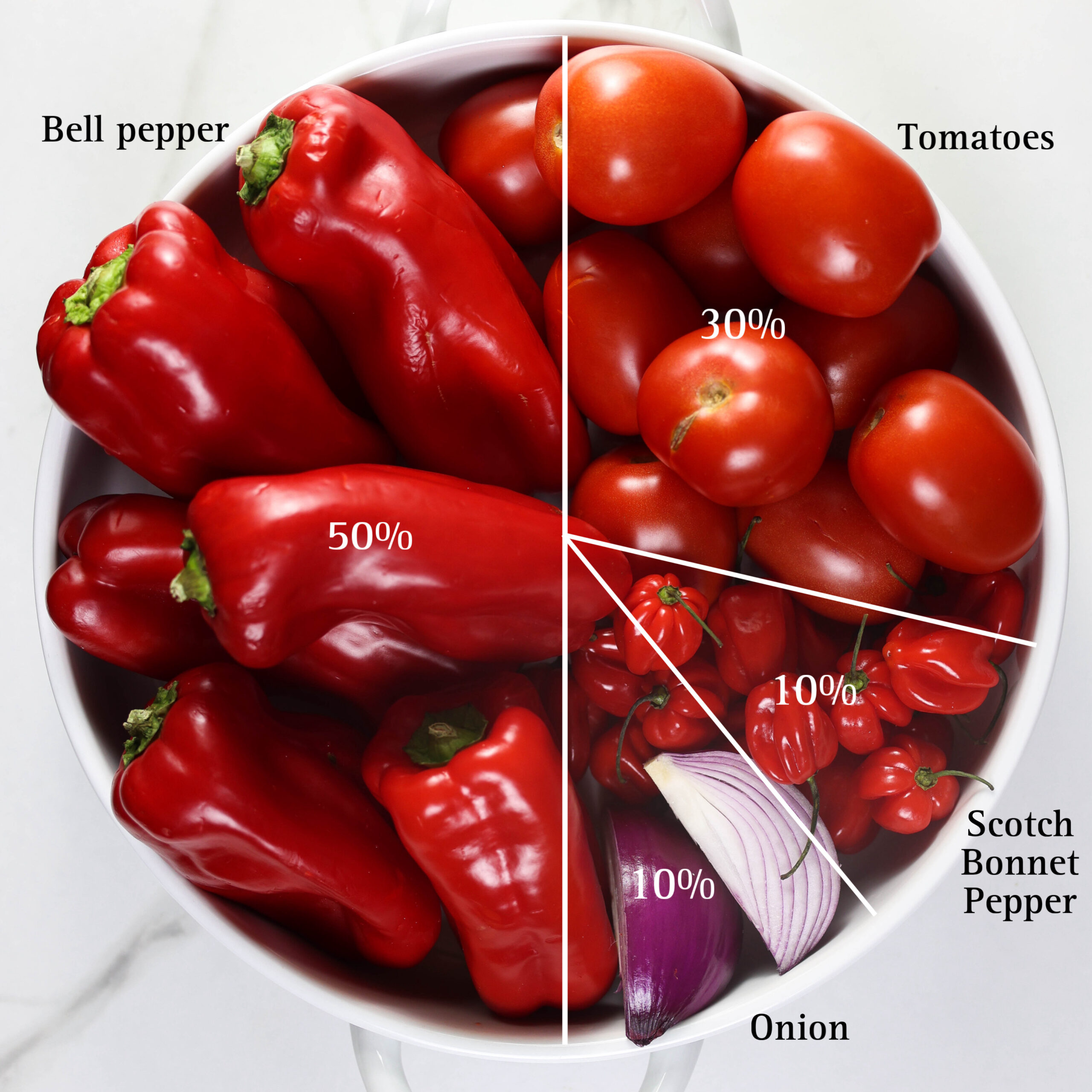
How to make the perfect stew base
Bell peppers: my pepper mix usually composed of 50% bell pepper. Bell pepper gives a bright red color, a good balance of sweetness. If using using the local tatashe, remove seeds and veins inside the pepper to avoid a bitter taste.
Tomatoes: For a well-balanced mix, I recommend using about 30% tomatoes in your stew. Tomatoes are acidic, so using too much can lead to a sour taste. Opt for ripe red tomatoes; if you’re outside Nigeria, Roma tomatoes are ideal for Nigerian stew. Always choose fresh tomatoes over canned ones, although the latter can be used as a last resort.
Scotch Bonnet Pepper: I like my stew a little spicy so i use approximately 10% Scotch bonnet pepper in the base. Adjust the amount based on your spice preference. Note that American/UK Scotch bonnet peppers are particularly more spicy, so use 1/2 or 1 pepper for a mildly spicy stew, or up 2 peppers for a spicier version. For a milder taste, remove the pepper seeds and veins. You can also substitute Scotch bonnet peppers with habanero or Bird’s Eye chili peppers.
Onion: Red onions are recommended, but any type of onion will work well.
How to make it vegetarian
To make this meal vegetarian, simply omit the meat and incorporate ingredients like mushrooms, beans, and tofu. Substitute chicken stock and seasoning cubes with vegetable stock or cubes for a vegetarian-friendly version.
Make it kid friendly!
To make this dish kid-friendly, opt for boneless chicken thighs or breast and cut them into bite-sized pieces for easier eating. Adjust the amount of peppers for children who can’t handle spicy foods. Enhance the nutritional value by adding peas, carrots, or any preferred vegetables in the last five minutes of cooking. Serve the stew with rice and diced plantains for a tasty and wholesome meal that kids will love.
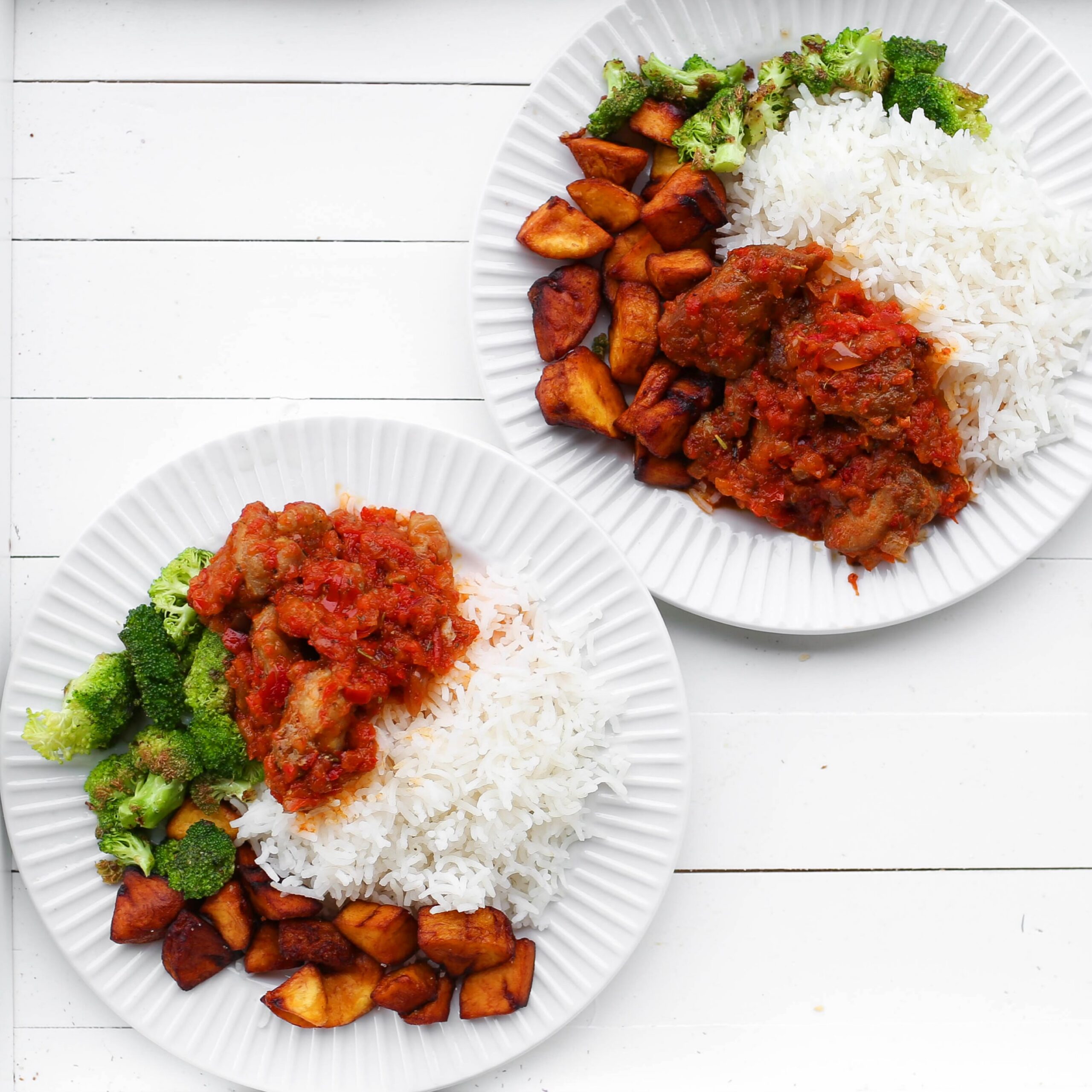
What to serve with Nigerian stew
Nigerian stew is incredibly versatile dish and pairs excellently with rice, bread, yam, pasta, potatoes, beans, Eba, or fufu. A classic combination includes serving the stew with rice and fried plantains. For a nutritious twist, consider adding cooked black eyed peas and vegetables to create a well balanced meal.
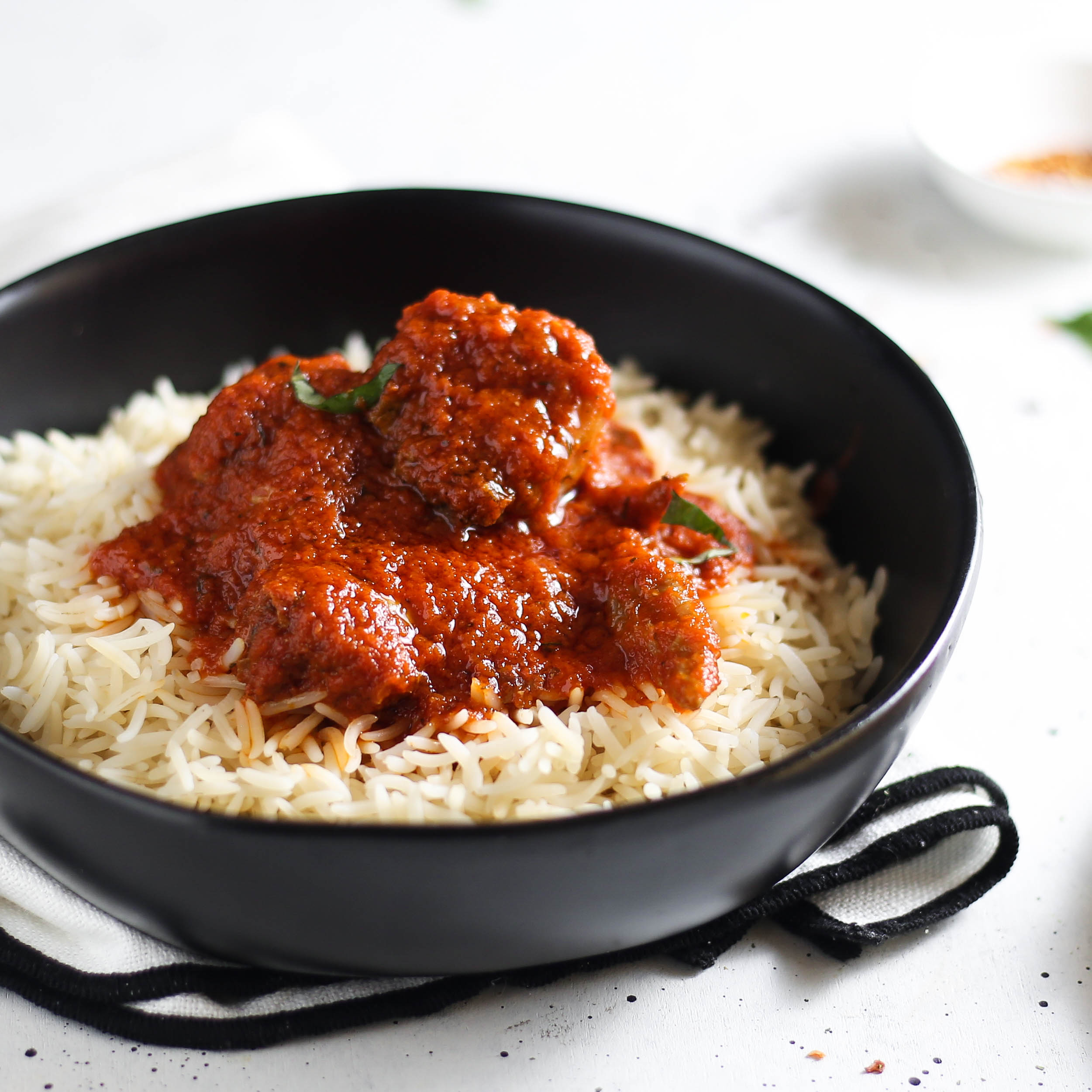
Don’t wait for your stew to finish cooking before boiling your rice. People are hungry! 🤭
How to store
You can store stew in an airtight container in the refrigerator for up to 4 days or in the freezer for up to 3 months.
Tip: separate meat from stew before storing so the meat doesn’t get too soft.
To store stew, place it in an airtight container and store in the refrigerator for up to 4 days. You can also store stew in the freezer for up to 3 months. A helpful tip is to separate the meat from the stew before storing to prevent the meat from becoming too soft during storage.
Questions and Tips
Can I use canned tomatoes for Nigerian stew?
I don’t recommend using canned tomatoes. I’ve tried various canned tomato brands, and while the stew doesn’t turn out bad, it doesn’t come close to stew made with fresh tomatoes.
Why is my stew not red?
The color of your stew depends on the ingredients. Choose the reddest, most vibrant tomatoes and peppers available. Using the right amount of bell peppers can also help give your stew a vibrant red color.
Why does my stew slap? / why is my stew sour?
This might be due to using too many tomatoes or using unripe tomatoes. Follow the recommended stew base ratio provided above for a well-balanced stew. To fix a sour stew, add ¼ to ½ teaspoon of baking soda to the cooked stew. Baking soda is alkaline and helps neutralize the acidity in the stew.
Should I use tin tomatoes/ tomato paste for stew?
While some people use tin tomatoes or tomato paste, I personally do not like the taste and I can always tell if it was used. If you do choose to use it, fry the canned tomatoes or tomato paste for at least 10 minutes until it turns a deep/dark red color. Frying removes the tangy/acidic taste, enhancing the flavor. Skipping this step may result in a sour stew.
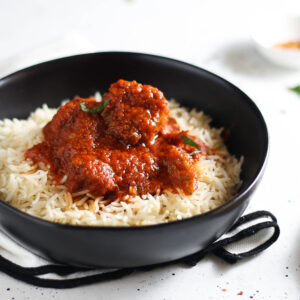
Ingredients
For the meat:
- 1200 g chicken
- ½ medium onion chopped
- 2 garlic cloves
- 7 g Ginger
- 1 teaspoon salt 9g
- 1 teaspoon curry powder 3g
- 1 teaspoon thyme 3g
- 2 chicken seasoning cubes
- 1 cup water
For the stew base:
- 5 large bell peppers
- 9 tomatoes
- A Handful of scotch bonnet peppers
- ½ onion
To make the stew:
- 1 cup oil for frying the meat
- Boiled down stew base
- ½ teaspoon curry powder
- 2 teaspoon thyme
- ½ chicken seasoning cube
- 1 cup chicken stock
- ½ cup water
- ¼ teaspoons salt
Instructions
- Clean the chicken thoroughly and place it in a deep pot. Season with chopped onion, garlic, ginger, salt, thyme, curry, and chicken seasoning cubes.
- Mix the seasoning, cover the pot, and allow the chicken to steam and cook in its juices on low heat.
- After 10 minutes, add water, cover, and continue cooking for an additional 10 minutes or until the chicken is about 80% done.
- Turn off the heat after 10 minutes, then separate the meat from the stock.
- Clean and blend the tomatoes, bell pepper, scotch bonnet pepper, and onions until smooth. Tip: add the tomatoes first to make it easier to blend without adding any or too much water.
- Add the blended mixture to a pot and reduce over medium heat. Avoid stirring the mixture while boiling to prevent splashing.
- Boil the mixture for about 30 minutes or until most of the water evaporates.
- While the tomato/pepper mix reduces, heat oil in a wide pan and fry the chicken. Alternatively, you can grill or air-fry the chicken.
- After frying the chicken, reduce the oil in the pan, return it to heat, and add the boiled down pepper mix.
- Season with curry powder, thyme, and chicken seasoning cube. Fry for about 10 minutes on medium heat, if the stew splashes, cover the pan almost all the way through. See note 1.
- Once the oil starts to float to the top, add the chicken stock, mix, and then add the fried/grilled chicken. Adjust seasoning if necessary. If the stew is too thick, add more chicken stock or water.
- Allow the stew to simmer for about 10 minutes on low to medium heat.
- Serve the stew with white rice. See note 2.
Notes
- Cover your pan but not all the way through so the stew can fry properly. You can also uselessly a splash cover if you have one. Fry on medium heat and star at intervals so it doesn’t burn.
- Nigerian stew is typically served with white rice. Traditionally, parboiled long-grain rice is used. Brands like Par Excellence, Golden Canilla, and Iberia Ben Original are recommended. Sella basmati or any preferred rice variety can also be used.
Did you make this recipe?
Tag, mention or DM @kikifoodies. I would love to hear from you!
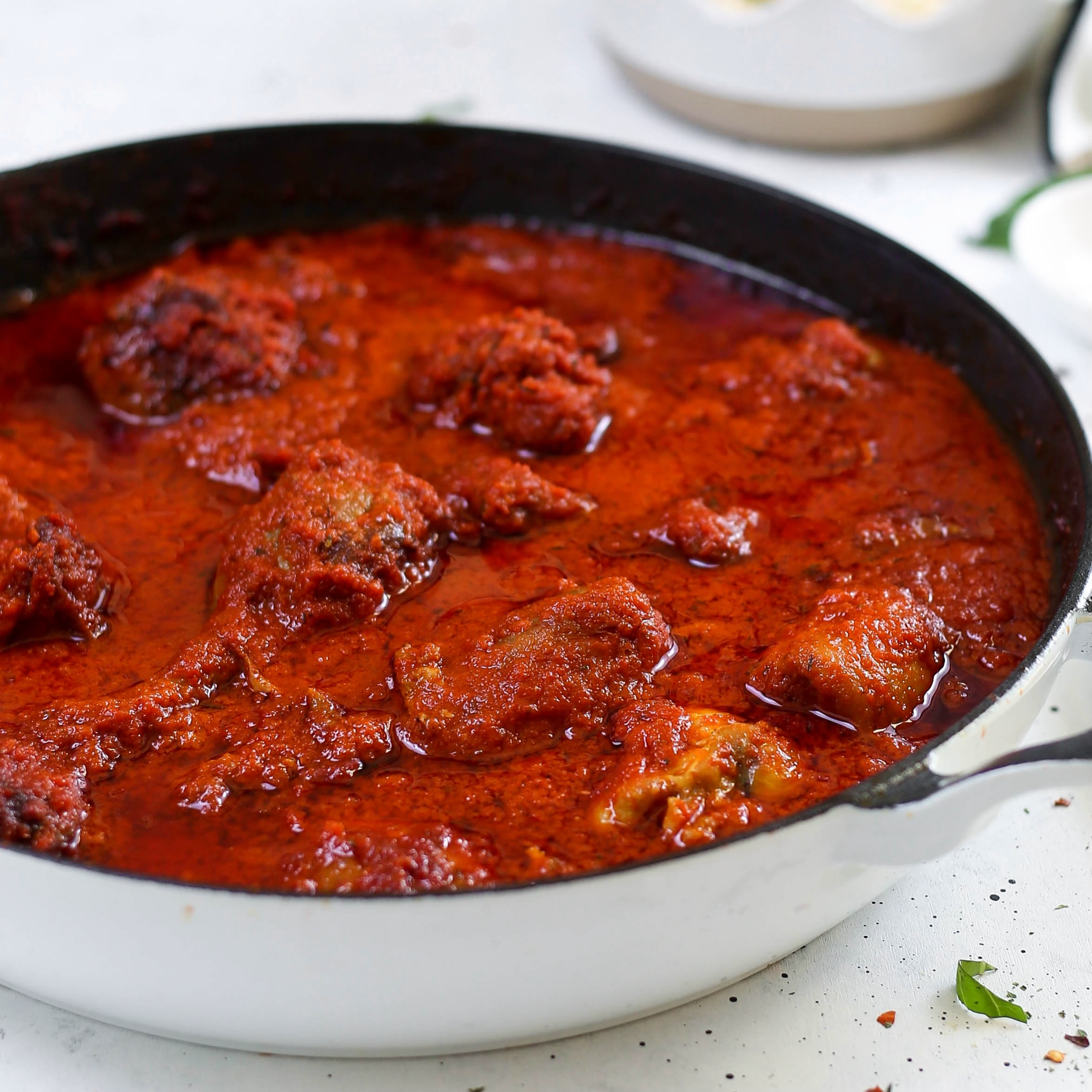

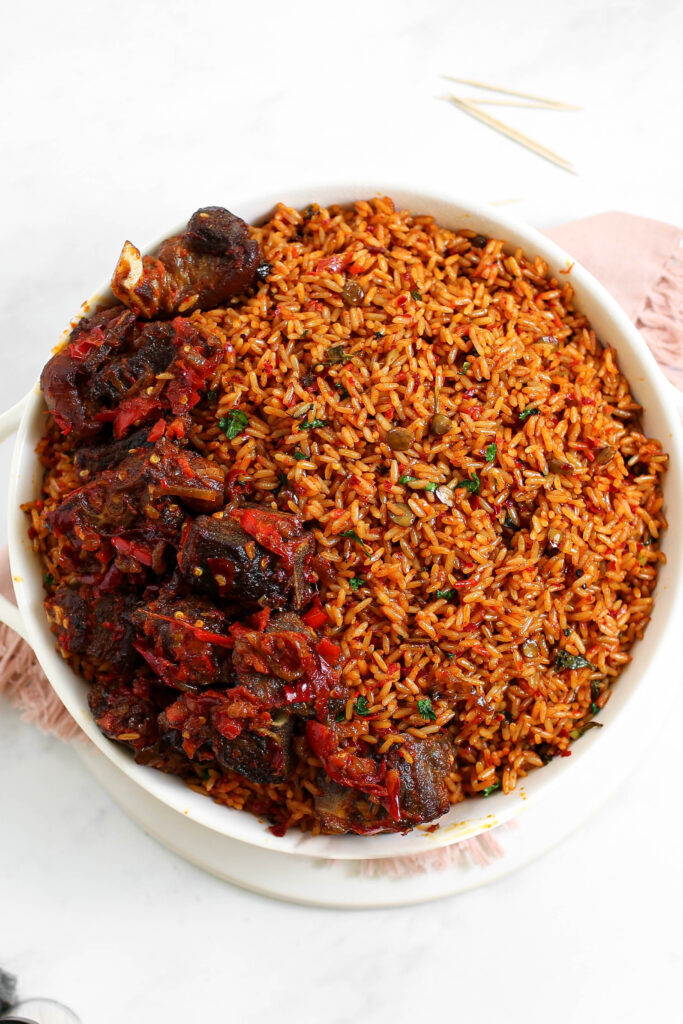

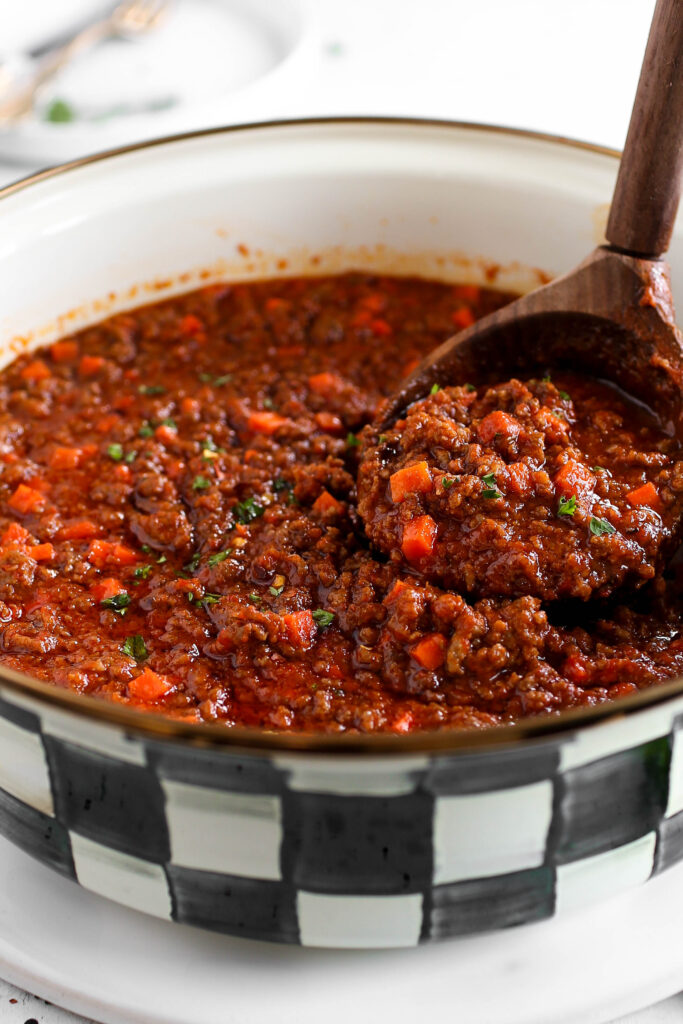
Absolutely loved how detailed this recipe is. Flavor so nice and the aroma while cooking is just amazing. Thanks!
10/10